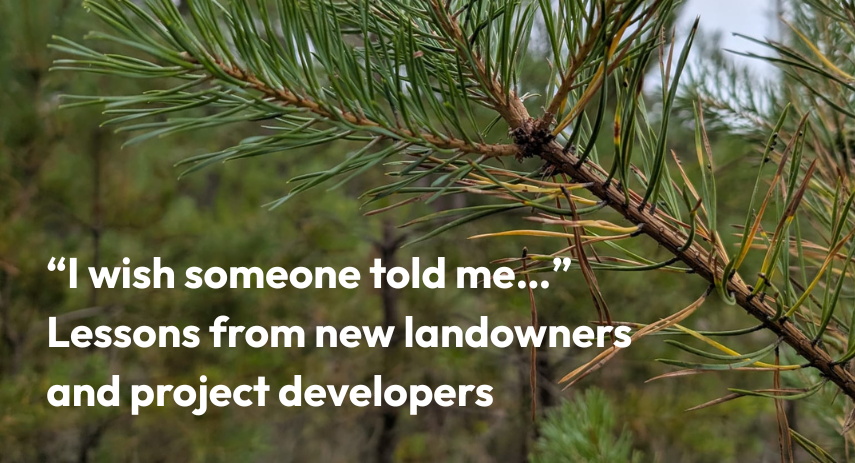
“I wish someone told me…”: Lessons from new landowners and project developers
Uwe Stoneman

When communities or landowners reach out to the Commission, it is often because of conflict. Communication has broken down and relationships are damaged. In extreme cases, conflict has become bitter and entrenched. No one benefits, and it can badly affect the wellbeing of everyone involved. When things get to that stage, a lot of effort, time, and resources are needed to restore relationships and re-build trust.
When landowners speak to us who find themselves in a situation like this, they tell us again and again: “I wish I had done things differently.” Usually they mean, they should have managed change differently - big change, such as a significant change in land use or a change in ownership.
Of course, each situation is different, but there are insights which come up repeatedly:
“I wish we had engaged with the community earlier”
“I wish we had been more transparent”
“I wish I listened more actively”
We think these are important learning points that are worth sharing.
Early engagement, transparency and listening. Why are these three things so important at shaping relationships going forward?
Land is important to communities – very important. What happens on the land and the way it is managed impacts some of our most important needs, such as housing, jobs, food, access to nature and well-being. Just pause briefly and consider what it is like where you live, in the area you call home: Is there forestry, farming, a wind farm, can you easily access nature, is it busy with tourists, is there a nature reserve, a grouse moor, a traditional deer stalking estate or is some of it being rewilded? Is it easy for local people to find a job and housing? How do you feel about your local area? How would you feel about change - large-scale, long-term change?
Now, just imagine that suddenly (and although it may not feel sudden to you, it is often sudden for others) you hear that a big part of your area has been sold to a new owner or that a local estate plans to change the way it manages the land. Would you have fears or hopes – or both? The chances are that you would want to know as soon as possible who the new owners are and what - if any - change are they planning.
Uncertainty leaves the door wide open for speculation and rumours which do not help to build trust, and once established, take a lot of time and resource to dispel. For this reason, and with hindsight, many new landowners and project developers tell us they wish they had been more transparent right from the start.
So, what about listening? Once you’ve introduced yourself to the community as a new landowner or project developer, it’s important to explain how people can contact you and how you make decisions. Let them know how you deal with feedback and what your vision and draft plans are. Be open about any obligations or constraints you’re working within. Sharing this information early on reduces uncertainty and helps build trust. People will be able to form a picture of you and your intentions, based on what you told them, rather than on assumptions and rumours.
Of course, people in the community might support your plans or strongly oppose them. Some may be keen to work with you, while others may try to challenge or influence your decisions. Local people may have knowledge that could be useful to you, but whether it’s shared will depend on how you engage. If you are a landowner or project developer, it is clearly in your interest to listen to the community.
For good community engagement, you need to know how the community functions, what its needs and ambitions are, how it relates to its surroundings, what historic and cultural ties people have with the land, so you can understand how your own plans may or may not naturally align. This insight helps you see where your plans align with local needs, and where they might not.
Active listening is most effective when you not only hear what the community says, but also take it on board and reflect it in your plans wherever possible. If there are constraints or obligations that prevent you from doing so, be open and explain why. Remember, even when views shared with you are challenging or not delivered constructively, you are being given additional information, and more information is usually helpful.
Engaging with the community doesn't mean agreeing to everything, and it’s not about trying to please everyone. The goal of community engagement is to build mutual understanding and trust, both of which help land in Scotland to provide public, private and local benefits.
Sometimes that means finding common ground and working together. Other times, it means respectfully agreeing to disagree. Either way, this will only happen if people listen to each other; and if you are a new landowner or project developer, listening to local people who call the area their home is also simply a matter of respect.
Further guidance
You’ll find guidance for landowners and communities – along with practical tools and resources – on our website. We recommend using these as a shared framework for engagement. Useful resources include:
- information about communities for landowners
- information for communities about land
- Community Engagement
We’re here to help – reach out for early guidance and support
If any elements of this blog feel relevant to you, whether you are a landowner or project developer or live in a community facing significant change related to decisions over land, the Scottish Land Commissions Good Practice Team is here to help. Get in touch, as early as possible by email to goodpractice@landcommission.gov.uk or by calling 01463 423 600. Leave a voicemail if we are unable to answer the phone.